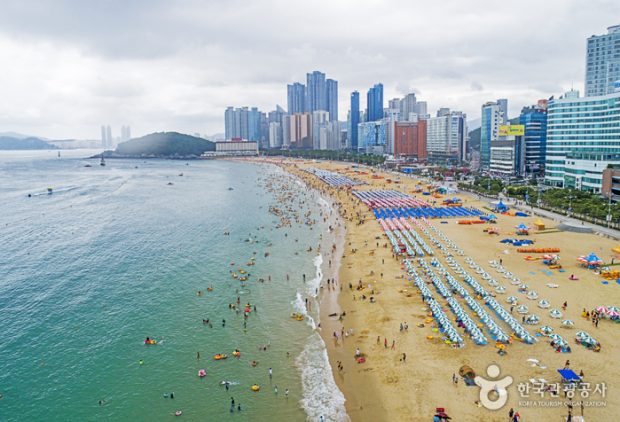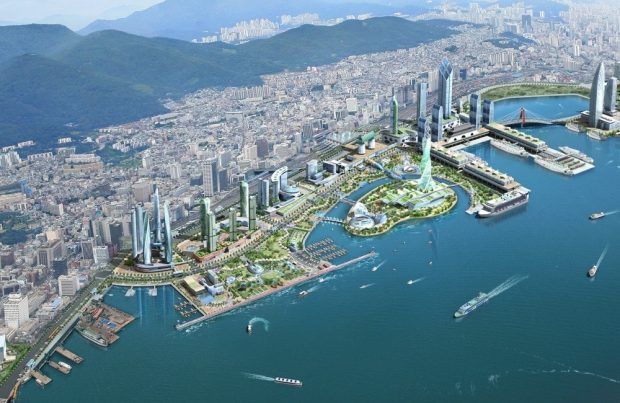
Busan: A vibrant city turning into prime model for the future

BUSAN: Few cities in the world can boast of a cultural program for October as appealing as the one listed by Busan, South Korea’s second-largest city.
On October 1-2, the Busan Rock Festival, Korea’s largest rock festival, returns after three years for performances at Samnak Eco Park.
The multiple-award winners BTS are on their way to the city for a free World Expo 2030 Busan support performance on October 15 in Asiad Main Stadium.
The Busan One Asia Festival (BOF) makes its comeback on Oct. 27 – 30 with diverse programs such as a “K-pop concert,” an outdoor “Park concert” and “BOF land”.
Busan is popular for its skyscrapers, beaches, majestic mountains and unique fish market. Across the world, it is known for hosting Asia’s largest international film festival- the Busan International Film festival.
Koreans now hope that it will soon achieve global fame by hosting the World Expo 2030.
If the bid successful, Korea will be the seventh country to have held all three major global events – The Olympic Games, the World Cup and the World Expo.

In 2021, the Republic of Korea submitted a letter of candidature to the Bureau International des Expositions (BIE) to organize World Expo 2030 in the city of Busan. The Republic of Korea candidature is based on the theme: “Transforming our World, Navigating Toward a better Future”.
If successful in its bid, Busan would host the expo from May 1 to October 31, 2030, a total of 184 days.
It would not be the first time that the prominent port city with a rich history would host a mega international event.
Busan hosted the Asian Games in 2002 and the APEC Summit in 2005.
The city, with its highly advanced infrastructure and wide network and connections all over the globe, has also hosted the world-famous Busan International Film Festival (BIFF), Busan Fireworks Festival, One Asia Festival and a global K-Culture Pop Music Festival.

Busan, with a population of about 3.5 million and an annual average of 40 million tourists, has also been a successful host of international conferences, such as the 2011 Busan World Development Institute General Assembly, the 2014 ITU Plenipotentiary Conference, the 2014 and 2019 ASEAN-ROK Commemorative Summit, the 2015 IDB Annual Meeting and the 2022 International Forwarders Associations (FIATA) World Congress.
Busan officials predict that about 200 countries would participate in its World Expo2030 and that 50.5 million people would visit it. The World Expo venue and the supporting facilities, would be over 2.66 square miles.
To highlight the magnitude of the World Expo 2030, organizers compare it favorably with other global events.
They say that the football World Cup is held over one month (not six like the Expo) and that it attracts only three million people (Not 50.5 million visitors like the Expo). The World Cup generates $8 trillion in economic (ripple) effect production inducement whereas the expo would result in $31.6 trillion, almost four times as much.
The international Olympic Games are held over 16 days, attract only three million people and generate $8.6 trillion, they say.
![Busan Mayor Park Heong-joon in an interview with the Korea JoongAng Daily on July 5 in Busan [PARK SANG-MOON]](http://www.theasian.asia/wp-content/uploads/2022/09/Mayor.jpg)
“No one will be able to stop this wave of innovation. Busan’s transformation towards a global hub city has already begun,” he said.
“The 2030 Busan World EXPO is a symbol of this transformation and will become a catalyst for further growth. Through ups and downs, the 2030 Busan World EXPO is now backed by the central government and prominent businesses.”
The President himself is ardently championing the city’s Expo bid, along with the CEOs of major conglomerates. Even BTS, a symbol of K-Culture has joined the campaign.
Hosting the World Expo is not just about hosting another mega event, but it is part of the process to cement Busan’s status as a global hub city.


